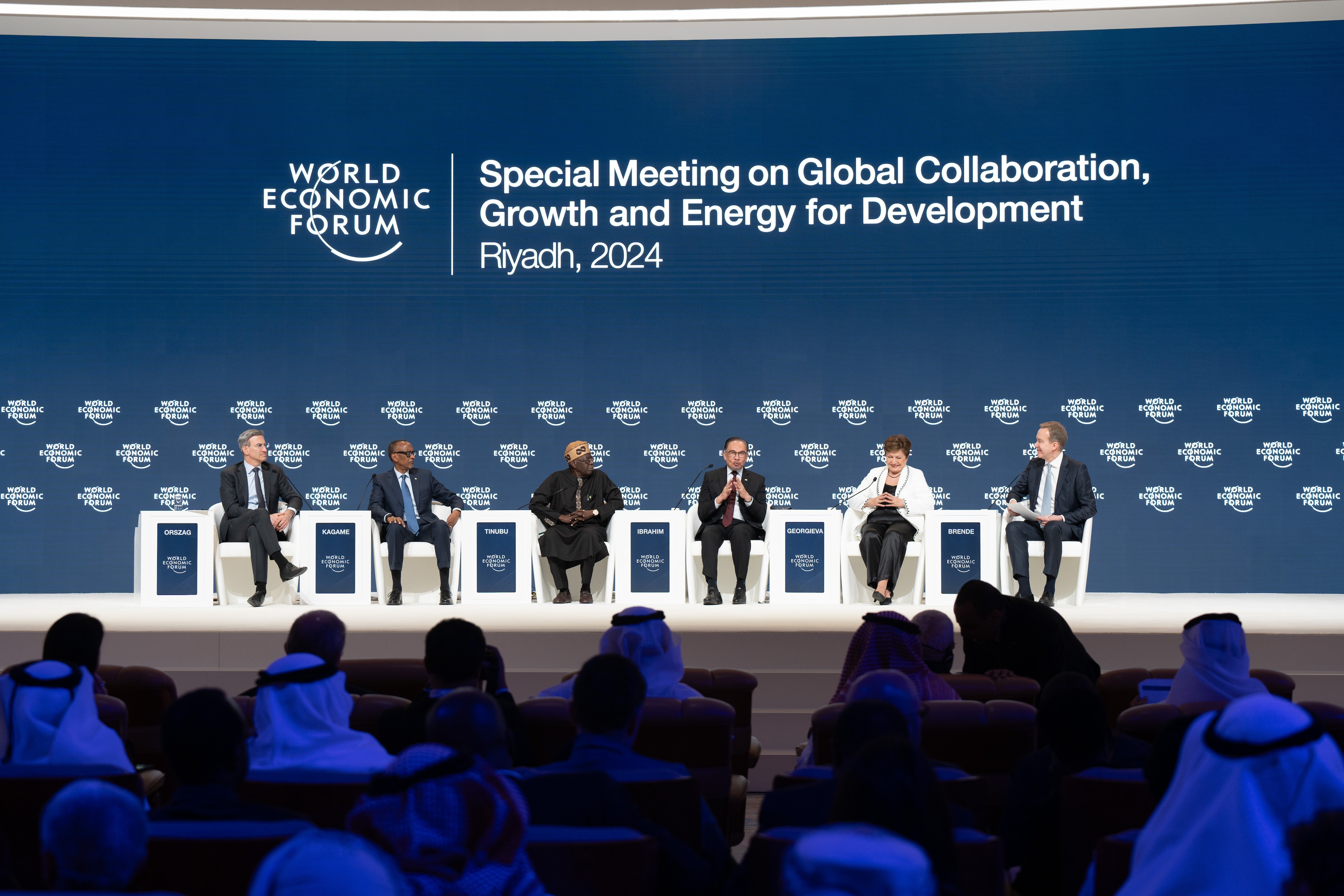Latin America is moving towards a sustainable economy. These are the challenges and opportunities

Latin America's natural resources could support global efforts on challenges such as food production and energy transition. Image: Elibet Valencia Muñoz/ Unsplash

Get involved with our crowdsourced digital platform to deliver impact at scale
Stay up to date:
Geo-economics
- Latin America is in a privileged position to achieve sustainable development while offering solutions to global challenges, including the green transition, food security and biodiversity preservation.
- The private and public sectors have crucial roles in enabling investments and tapping into the region economic potential.
- Business and policy leaders discussed the region's opportunities during the World Economic Forum Annual Meeting in Davos, highlighting that the world needs Latin America today as much as Latin America needs the world.
Latin America is at a crossroads and finds itself in a privileged position to support global efforts on energy transition, climate change, food security, biodiversity preservation and reconfiguration of supply chains. At the same time, the region grapples with longstanding challenges such as low growth, workforce skills and security.
Business and policy leaders from Latin America discussed the region’s challenges and opportunities during the Annual Meeting of the World Economic Forum in Davos, highlighting how the present circumstances could be a "turning point" for building a sustainable and resilient economy.
Inflation and growth
The "good news" is that most countries in the region have inflation under control, according to Julio Velarde, governor of Peru's Central Bank. Although the landscape remains heterogenous with countries' economic performances differing across the region, "inflation, which spooked everyone at some point, is under control" and central banks have started lowering interest rates.
Growth, however, remains a challenge, according to Velarde. The two largest economies in the region, Mexico and Brazil, have traditionally seen low growth while better performing economies until recently, like Peru, Colombia and Chile, have also slowed down. Growth-enabling reforms carried out in the 1990s were largely "forgotten", according to Velarde, hindering the fight against poverty. The region needs a renewed push towards an investment-friendly reform agenda, he said.
Supporting the global transition
Despite this mixed outlook, Latin America is well positioned to play a crucial role in the world's transition towards a more sustainable economy, given its vast sources of renewable energy and minerals that will power a greener future, a strong agricultural exporter sector to feed a growing global population, and a neutral geopolitical stance that enables it to develop strong ties in a multipolar world.
"Latin America can and must take a leading role in global sustainability because we have biodiversity, we have the largest amount of drinking water in the world, we have the Amazon which provides carbon storage for the world," said Luís Roberto Barroso, the president of Brazil's Supreme Court.
"Except for an incident or another, we have good relations between out neighbours, democratic normality has remained in the largest countries, we have no religious conflicts and we are a multiracial society. So without rejecting the complexities that exist and which we need to address, I think Latin America provides major potentials to the world that can be tapped into if we find the right pathway."
Have you read?
The role of the private and public sectors
Latin American businesses present in Davos highlighted the crucial role of the private sector in tapping into the region's potential, as well as the role of governments in enabling investments through the clear delineation of frameworks and policies. Luis Henrique Guimarães, board member Cosan, said that Brazil is well positioned to benefit from the world's decarbonisation given its competitiveness in energy sectors including biofuels, mining and agriculture.
He emphasised that "the investments are coming from the private sector", but the Brazilian government is enabling investments with recent regulations on the energy transition, hydrogen and the carbon market, enabling growth and the creation of high-quality jobs.
Marcos Bulgheroni, CEO of Pan American Energy, highlighted how key sectors have taken technological innovation on board, for example the agricultural sector. "The agricultural sector was traditionally a sector of low job creation, low use of technology and low innovation.
However, in the last few decades, we have seen a revolution with the incorporation of technologies and processes that have totally changed the way in which agricultural producers approach their work." According to Bulgheroni, improvements in seed technology and crop management have increased productivity and allowed better use of soils.
In the last few decades, we have seen a revolution with the incorporation of technologies and processes that have totally changed the way in which agricultural producers approach their work.
”A successful case of public and private interest is the Mexican state of Baja California, which borders California and Arizona and has become one of Mexico's fastest-growing states even before the recent trend of near-shoring gave Mexican business and advantage over China to benefit from the proximity with US supply chains.
Baja California governor Marina del Pilar Avila Olmeda said "near-shoring is something we have been doing for a long time given the endogenous conditions of our state", located in a dynamic border area which is home to 7m people and on the country's Pacific coast, facilitating trade with Asia. These conditions have enabled the state to focus on key industries such as semiconductors, biotechnology and medical tourism.
The key to Baja California's attractiveness for investors is talent, Pilar Avila said. "Today the biggest investments are looking for talent. We have more than 90 universities in Baja California, which is specifically the economic policy of President Andrés Manuel López Obrador. It has led to this strengthening of national policy and especially in investment confidence," she said. Public policies ensure investment is a driving force of growth but also translates into higher skills and wellbeing for the population.
The era of cheap labour in Latin America is over. Today we are talking about the creation of talent and that magic formula between the private sector, the universities, the public sector, which has allowed us to become an attractive state for the world.
”'The world needs Latin America'
Some of the challenges of transitioning to a sustainable future are financing, particularly of the emerging bioeconomy, and ensuring the region stays on course in terms of security and governance.
Ilan Goldfajn, president of the Inter-American Development Bank, emphasised that green financing was high on the IADB's agenda with a "holistic approach" going beyond environmental preservation and considering impact on people, cities, infrastructure and the economic value of standing forests. The scale and impact required for the transition cannot be achieved by the public or private sector alone, he said, neither by indigenous and local governments without support.
Latin America is at a turning point because, for the first time, we are in a symmetrical relationship with the world. Latin America and the Caribbean always needed the world but now the world needs Latin America and the Caribbean.
”In his opinion, Latin America is facing "a unique opportunity" to chart its own path of sustainable development while becoming part of the solution to some of the most pressing world problems, including clean energy, food production, and the protection of natural biomes, like the Amazon.
What’s the World Economic Forum doing about deforestation?
Don't miss any update on this topic
Create a free account and access your personalized content collection with our latest publications and analyses.
License and Republishing
World Economic Forum articles may be republished in accordance with the Creative Commons Attribution-NonCommercial-NoDerivatives 4.0 International Public License, and in accordance with our Terms of Use.
The views expressed in this article are those of the author alone and not the World Economic Forum.
Related topics:
The Agenda Weekly
A weekly update of the most important issues driving the global agenda
You can unsubscribe at any time using the link in our emails. For more details, review our privacy policy.
More on Forum InstitutionalSee all
Maroun Kairouz
May 3, 2024
Gayle Markovitz
April 28, 2024
Gayle Markovitz
April 27, 2024
Mirek Dušek and Maroun Kairouz
April 27, 2024
Kate Whiting
April 26, 2024
Spencer Feingold and Gayle Markovitz
April 19, 2024






